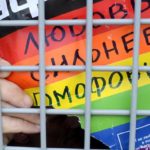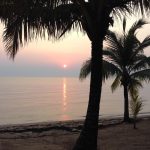(Updated September 2016)
A better title for this story would be ‘Gay Santo Domingo’ since outside this capital city there is very little identifiable LGBT life in the Dominican Republic. 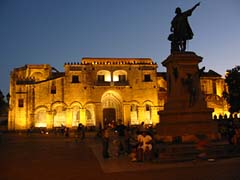 Most natives come to the capital city Santo Domingo if they realize they are different and look to make a community of friends And indeed they do come here and they do find a new family. In my swing through the northern corner of the Caribbean, I first went to Jamaica, Cuba and Haiti. In all three of these countries LGBT folks live shadow lives, treading carefully between authorities who don’t react kindly to homosexuals and a populace who range from very homophobic (Jamaica) to laissez-faire homophobic (Cuba).
Most natives come to the capital city Santo Domingo if they realize they are different and look to make a community of friends And indeed they do come here and they do find a new family. In my swing through the northern corner of the Caribbean, I first went to Jamaica, Cuba and Haiti. In all three of these countries LGBT folks live shadow lives, treading carefully between authorities who don’t react kindly to homosexuals and a populace who range from very homophobic (Jamaica) to laissez-faire homophobic (Cuba).
But Santo Domingo was a pleasant surprise—actually it was a startling surprise. Expecting another uptight gay-unfriendly culture I had found very little about gay life in Dominican Republic on the Internet before I flew into town with one contact name and the addresses of a couple of gay haunts. By the time I left I had visited three of the liveliest discos/clubs in the Caribbean, circulated throughout most of the city and met four very articulate lesbigay people who essentially informed me that LGBT life was quite alive and well although somewhat inhibited in Santo Domingo.
An Energetic Scene
The first very visual proof of this was very evident when I visited the stylish and trendy disco club called Aire not far from the main pedestrian mall Conde. This club is one of two owned by a man named Jordi, the other is in Barcelona. Aire is a sleek music club with a large courtyard dance floor and three bars. One bar is open to the sky in a palm garden and another is done all in white. The chic style can rival any venue in New York or Berlin. The sound system is enormous of course and the DJ is a real pro. But I was a bit early; it was 11:30 PM and only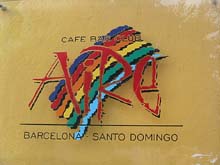 a scattered few well dressed patrons had arrived. So I chatted with some of the staff and found out more about Aire, its numerous theme nights, about other clubs and that Jordi was in Europe.
a scattered few well dressed patrons had arrived. So I chatted with some of the staff and found out more about Aire, its numerous theme nights, about other clubs and that Jordi was in Europe.
A few days later I went back to Aire after midnight, on a weekend. Before I went in I watched some of Santo Domingo’s trendy youth arrive for a night of dancing, drinking and socializing. I was surprised again this time by the appearance of well-dressed men and women, some arriving in their SUVs and newer cars.
Now, DR is not known as a prosperous country. Its general reputation is that of a poor country struggling to hold its economy together especially with the slowdown in tourism. Away from the urban areas there are a lot of impoverished people living off the land or working at manual jobs. But there is also a level of prosperity in Santo Domingo that is higher than many Caribbean places. The government has been relatively stable with corruption under control (sort of) and a reliably fair legal system. The Dominican Republic lacks the political and class tensions of Jamaica, the instability of Haiti and the repression of Cuba thus allowing a good amount of free enterprise cash to flow into and around the country resulting in an easy freedom in the culture.
Although tourism is down, there are still numerous attractions for winter sun-seekers such as smooth white beaches, extensive coral reefs for diving, rain forests and colorful rural craftsmen turning out carvings, paintings and woven fabrics.
So the arrival of these energetic nighthawks at Aire in their sleek designer jeans and dress shirts reflects a class of middle-scale Dominicans who feel confident with their sexual identity and know how to express it (within prudent limits) without fear of any government action to inhibit them.
Gay Businessmen and their Business
In my chat with Aire staff, they said there was another trendy club, Atlantis, across town on the Malecon waterfront. The next day I sat down to lunch with the owners who are also long term partners.
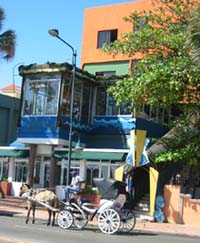 The essential question of what it’s like to be gay in DR was our first exchange. One patner didn’t speak English so he left to take care of business. His other half spoke as if he lived in a major European country with gay rights. “I have no problem here with gay,” he said. “Maybe if a person worked in a bank he might have some trouble, but if he is a high professional I don’t think it would happen.” He didn’t know anyone who had ever been fired from a job for that reason.
The essential question of what it’s like to be gay in DR was our first exchange. One patner didn’t speak English so he left to take care of business. His other half spoke as if he lived in a major European country with gay rights. “I have no problem here with gay,” he said. “Maybe if a person worked in a bank he might have some trouble, but if he is a high professional I don’t think it would happen.” He didn’t know anyone who had ever been fired from a job for that reason.
Not that it couldn’t happen because there is the usual Hispanic-Catholic homophobia in this culture. He said a lot of people live in the closet here as a singles or in the closet of marriage. He claimed he has never felt any pressure from his Catholic family to get married. They stopped talking about marriage a long time ago when they realized that his ‘roommate’ was no casual friend and not about to leave. He has never experienced any harassment personally nor have they as a couple ever been directly opposed or rejected for being a gay couple.
I was told that reactions to gays depended on things like education and family attitudes. Also, reaction here to same-sex activity is tempered by a discreet but prevalent Latino ‘soft sexuality’ commonly found in Hispanic countries in central and south America. “You know I think more than fifty percent of guys in DR are bisexual,” said one with a laugh, “so we have what you say is a flexible mind about that.” Currently, there are popular transvestite hosts on TV programs and newspapers have a gay–friendly attitude.
This couple’s circle of friends includes many straight and gay couples as well as singles. Being in a public business for many years has brought them into contact with numerous vendors, businessmen, tourists and tourism workers, city officials as well as a wide variety of customers. This partner was not aware of any gay or lesbian friend or acquaintance who had faced overt discrimination. I was surprised to hear him say this because his social and professional affiliations cut a wide swath across the life of Santo Domingan life. The few reports I was able to find about DR, before my trip, stated or strongly suggested the opposite was true–that homophobia was common in DR. (Perhaps why this couple preferred not to be named?)
When I asked about reports about hostility toward gays, one owner said yes of course there are neighborhoods where it is not safe, but that’s for anyone not just gays. Talking about this topic seemed alien to him; for the most part he has been engaged as a businessman not an activist or risky gay cruiser along the avenue late at night. For all his years in dealing with the larger conservative straight public, he felt free and comfortable and prosperous.
In his business dealings there is no police harassment, no corruption and no bribes paid to have them look the other way. This is all the more remarkable since at 2:30 AM, four nights a week, there is a drag show as well as a male stripper (down to a bikini) ‘. I went one night to see this show and the drag performers were quite good. Dressed in svelte hand-made gowns and boas these anorexic-thin folks belted out their theme songs with all the Judy Garland passion they could muster. Some audience members stuffed money bills into their ‘cleavage’ to the delight of everyone.
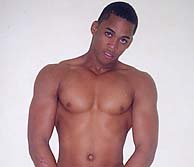 I thought the strippers (there were two drag performers and two strippers) were a bit too posed and expressionless (with tough macho faces), perhaps to remind the mixed but mostly gay audience that they were straight. They simulated sex first with an embarrassed but willing female audience member and then with an equally embarrassed and thrilled male member. I doubt either of the audience participants was gay; there are quite a few straight couples who go to these clubs and appear as relaxed as the lesbigay folks. But whatever the mix, the audience applauded and cheered and all appeared to have enjoyed the ‘sensuous’ moment. Oh, yes some audience members also stuffed a few bills into the boys’ bikinis as well.
I thought the strippers (there were two drag performers and two strippers) were a bit too posed and expressionless (with tough macho faces), perhaps to remind the mixed but mostly gay audience that they were straight. They simulated sex first with an embarrassed but willing female audience member and then with an equally embarrassed and thrilled male member. I doubt either of the audience participants was gay; there are quite a few straight couples who go to these clubs and appear as relaxed as the lesbigay folks. But whatever the mix, the audience applauded and cheered and all appeared to have enjoyed the ‘sensuous’ moment. Oh, yes some audience members also stuffed a few bills into the boys’ bikinis as well.
I had to laugh to myself as I was leaving Atlantis. Immediately next door is one of Santo Domingo’s elite brothels. Prostitution is legal here and there are city-approved houses where gentlemen go to select their ‘escorts’. Some venues are set up for sex on the premises and others are set up for ‘take-away”. Either way it’s not cheap. The name of this particular parlor was ‘Doll’s House’. (I wondered if the owner was aware of that same name for one of Henrik Ibsen’s most famous plays about a women escaping the confines of her controlling husband–about women’s lib. It was a poignant thought since many women are trapped by poverty and circumstances to earn money as sex workers.) Outside the two very different clubs there were numerous taxis waiting to take the exhausted late night revelers home to their beds.
Social Gay Discrimination
Despite the ‘gaity’ in the clubs, there are subtle but plapable undercurrents of discomfort that flow within the gay (male) community in SD. In my conversation with an American travel agent who frequently leads tours to the Caribbean and South America, this analysis was offered by David Lee, owner of Santo Domingo Gay Tourism (info@santo-domingo-gay-tourism.com):
David: “We have a travel group that travels to gay (sexual tourism) vacation locations, like Santo Domingo(SDQ), and RIO in particular. You mentioned a couple of the places we share in common, like Atlantis Club and Aire Club; we do go to Atlantis to watch the drag shows and we have been to Aire for fund raisers.
“But I find the local gays to be snobs that practice class distinction and look down at the “Boogie Boys” who make a living at ‘entertaining’ American men. Our clients are just down home, individuals who believe in live and let live; we have no problems with taking our Dominican boys/friends to a nice restaurant or shopping in the major malls. We don’t think about class and so we find it rude on the part of the “haves” that look down on the “have nots” in their own culture.
“It is my observation that discrimination is also of an economic nature. I’ve experienced, as have my friends, who have middle class gay friends in DR and when the two classes meet, the poorer of the two tend to withdraw, choose to not be around the middle class gays.
“I’ve not really experienced the middle class outwardly discriminating against the lower class, but there are real differences. The native boys we associate with don’t seem to have a problem being seen in public with us Americans, (they consider it a job) but they do not associate with known Dominican gays. So there are differences on both sides and the Americans who come for tourism trade find themselves in the middle, easily associating with both classes.
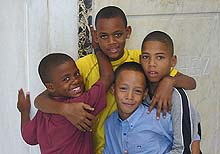 “However, I’ll tell you that the “have nots” also don’t associate with the “haves” and much to the dismay of a Black American, like myself, the “have nots” seem to know their place and are very uncomfortable in a setting that we as Americans would consider normal, i.e. going to a nice restaurant in a major hotel or going to a middle class gay club like Aire, where there are “rich and middle class Dominican gays”.
“However, I’ll tell you that the “have nots” also don’t associate with the “haves” and much to the dismay of a Black American, like myself, the “have nots” seem to know their place and are very uncomfortable in a setting that we as Americans would consider normal, i.e. going to a nice restaurant in a major hotel or going to a middle class gay club like Aire, where there are “rich and middle class Dominican gays”.
“Of course it is our American perception, especially being Black and having earned the right to go anywhere and associate as equals with anyone, that seems to cause me the most concern. I really feel anyone has the right to go anywhere as long as they can afford it and present themselves in a respectful manner.
“Some gays look down on people like our group because we pay for sex. But to put a human face on what we do, we always try to do our part in contributing to the cause, donating to gay fund raisers at the clubs we frequent and through our financial contribution to the “Boogie Boys”, many of whom we have a real relationship with and have met their families and even become part of their families.
“As a matter of fact, I stopped my United Way contributions back in the early 90’s and moved that annual money to the family of my dear friend and Brother, Freddy Mejia, whom I continue to promote through my e-mail presentation on SDQ as Tour Guide and Security. I’ve watched his children grow up, I’ve received him and his wife in my home and I make my usual visits to his home whenever I’m in SDQ. ”
A Leading Educator/Activist and His Business (Also see Dominican Republic News/Reports-HIV)
As for the education and activist energy of Santo Domingo , that seems to have fallen on the shoulders of Leo Sanchez and his cohorts at ASA, Santo Domingo ’s main LGBT/HIV agemcy, Amigos Siempre Amigos (Friends Always Friends). A strong, confident, sensual and articulate leader, Leo is an outspoken advocate of gay and HIV patients’ right to anyone who will listen–on the radio, in the press or in person to groups of government workers, NGO personnel, and private business companies. Leo is busy educating, advising and counseling. He has been a forceful voice for ten years in the battle against ignorance, prejudice and indifference toward HIV, AIDS and homosexuality in Dominica.
ASA has its office not in some convenient old town restored office building where the tourist and trendy shops are. No, this organization is very grass roots in its intention and focus. The office is on the second floor of a cafeteria in a run-down neighborhood where trashed cars are left to rust among some dilapidated buildings and assorted dismal shops.
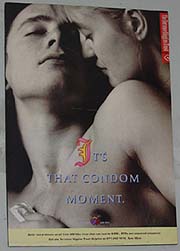 “This is where the people live we want to reach.” Leo said gesturing down the busy street snaking among bruised residential flats and business venues. “People trust us and they can come here to talk or get information, They don’t want the tourist area. Here we can teach and do our training of counselors to go out and train other counselors.” Leo gave me a tour of the six rooms of ASA’s office. It was very evident that a lot of activity happens here. Shelves with stacks of brochures about HIV, self esteem, sexual identity, homo-heterosexuality crossover activity, active/passive/versatile safe sex behavior; chairs and a chalkboard with notes left over from a group training; computers with databanks, resources and communications.
“This is where the people live we want to reach.” Leo said gesturing down the busy street snaking among bruised residential flats and business venues. “People trust us and they can come here to talk or get information, They don’t want the tourist area. Here we can teach and do our training of counselors to go out and train other counselors.” Leo gave me a tour of the six rooms of ASA’s office. It was very evident that a lot of activity happens here. Shelves with stacks of brochures about HIV, self esteem, sexual identity, homo-heterosexuality crossover activity, active/passive/versatile safe sex behavior; chairs and a chalkboard with notes left over from a group training; computers with databanks, resources and communications.
There were three offices for other dedicated members of the ASA team. Leo’s office was a controlled swarm of papers, binders, magazines, books and posters, a computer and a desk heaped with paperwork. One artistic and effective poster showed two men embracing with the caption “it’s that condom moment” printed across the bottom. (photo right)
The staff at ASA have been busy over the years training a network of health educators to pyramid out to other educators. Over 56,000 personal contacts with high-risk groups (sex workers, MSM, Haitians) have resulted from more than 1300 original educators. But more recent studies indicate, as in some USA cities, a rise in infection rates. As a result, more pointed and direct programs like ‘Stop AIDS’ were initiated to bring down the rates specifically among gay men.
Through community outreach to gays in the various clubs and bars, through educational groups called ‘Entre Hombres’ that use frank and impactful language to bring about sexual behavior change and through services such as HIV counseling for individuals, families and gay couples—through these effective approaches has ASA been able to influence the infection rate and the consciousness of the culture. It is the only place in Dominica where gay counseling is offered and I think it’s probably the only place in the entire Caribbean where such affirming counseling is offered to gay couples.
It’s relevant to note that DR has a high literacy rate and many Dominicans like to learn beyond the school years. I saw numerous people sitting on park benches studying notes and texts. In the National Museum of the Dominican Man, on Sunday, I saw groups of students taking notes on the historical displays about the development of civilization and culture in their country. This facility and curiosity among most people makes ASAs job somewhat easier because people are receptive to useful information, especially if it concerns their own personal lives and health.
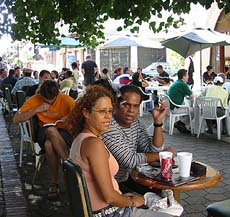
A Chat in the Shade
Leo and I had first met at a lovely tree-shaded café across the square from the Primate Cathedral of America, the oldest cathedral in the Americas (Christopher Columbus’ son laid the corner stone!). We talked about ASA’s work regarding HIV, gay rights, resistant politicians, lack of government funding (ASA’s money comes mostly from private charitable and health organizations), the relative freedom of expression in Dominica and more.
My impression of ‘gay Dominican Republic’ changed from initially negative, prior to my arrival, to very positive after seeing the undisturbed freedom with which the discos operated. But, however erotic and lively and musical these late night-clubs were, they represented only the shiny tips of the chilly iceberg of Dominican society’s more conservative bulk. Leo helped temper my impressions from Aire, Atlantic and a third place I saw briefly, Red Zone. From these highly energized watering holes it’s easy to think gay life here is wide-open in a liberal city.
Talking with Leo, my impression again changed, from positive to neutral (not bad for a Caribbean culture). His task of working with a resistant government and against sexual prejudices has not been a breeze. As we spoke, a dear lesbian friend of Leo’s, Jackie, happened by and sat down with us and moved into our conversation about LGBT life.
Jackie is a professor of social sciences at FLACSO a college in Santo Domingo. A lively and outspoken woman, she thought that the younger generation of lesbian were more bold and coming out earlier. Encouraged by the mothering role model of ‘Scarlet’, owner of O’Hara’s lesbian pub in Santo Domingo, young women seemed not as hindered by traditional social roles imposed on women in Dominica to be subservient and unambitious. “Now some of them want a life that’s more than making babies so men can prove themselves. A lot of lesbians have straight friends. One of them told me a straight friend said she wished she could be a lesbian so she didn’t feel attracted to men and get pregnant,” laughed Jackie.
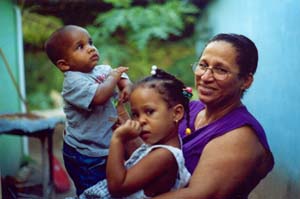 Shortly after that, as the three of us sat in one of the many Internet shops in the Colonial district looking at my web site, Jackie’s attractive and energetic amour, Alexandra, came by to see us. The conversation about lesbigay life picked up again as the four of us (well, they talked and I listened) digressed to a friendly disagreement about differences between men’s and women’s issues. Alexandra spoke perfect ‘American’ English, without an Hispanic accent. I was amazed that she had learned all her English in Dominica; she could have been raised in Baltimore!
Shortly after that, as the three of us sat in one of the many Internet shops in the Colonial district looking at my web site, Jackie’s attractive and energetic amour, Alexandra, came by to see us. The conversation about lesbigay life picked up again as the four of us (well, they talked and I listened) digressed to a friendly disagreement about differences between men’s and women’s issues. Alexandra spoke perfect ‘American’ English, without an Hispanic accent. I was amazed that she had learned all her English in Dominica; she could have been raised in Baltimore!
The two women thought there was a lot of homophobia in their culture. The most common reaction of families to a gay child, Alexandra thought, was to reject and deny the truth and pretend it wasn’t said. “But this is not surprising because of the very strong influence of the Catholic church here—both in the church and in the government. That’s why gays and lesbians still have no protections. The Cardinal here actually said he thought gay people should be burned in the public square. Can you believe that—from a man who is supposed to be a Christian !?”
Being Gay, Out and Loud—Not
It isn’t illegal to be gay in DR. There is no distinction in the laws between homo- and heterosexual relations between adults over 18 years. There are reports that public morality laws have been used against gay men on occasion. Article 330 of the Penal Code prohibits “every violation of decorum and good behavior on public streets” with up to 2 years’ imprisonment. However, Leo thought this was unusual and did not know anyone in his network of friends and acquaintances who had been stopped by the police.
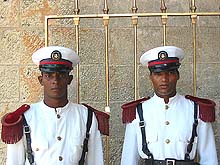 But resistance is there nevertheless. In 2001 an informal gay Pride event was held with no apparent opposition, However this may well have been because the authorities didn’t really understand what the gathering was about. Subsequent Pride-fest efforts have been denied police permits in the central downtown Colonial district. So the coming together of Santo Domingo ’s LGBT community hasn’t really happened; there isn’t really a coordinated community. Jackie said most intellectuals in DR are in the closet while other potential organizers hesitate to confront the authorities. Putting one’s reputation on the line is not a comfortable thing to do in this country.
But resistance is there nevertheless. In 2001 an informal gay Pride event was held with no apparent opposition, However this may well have been because the authorities didn’t really understand what the gathering was about. Subsequent Pride-fest efforts have been denied police permits in the central downtown Colonial district. So the coming together of Santo Domingo ’s LGBT community hasn’t really happened; there isn’t really a coordinated community. Jackie said most intellectuals in DR are in the closet while other potential organizers hesitate to confront the authorities. Putting one’s reputation on the line is not a comfortable thing to do in this country.
But one bold leader did make noise over 15 years ago. Ceasar Mata deserves credit for the early organization of an HIV/AIDS group to reach out to high-risk people. With some funding from non-governmental groups (NGOs), he helped start ASA early programs, which were social ‘parties’ aimed at teaching about the virus and prevention methods. The parties helped to sidestep the strong stigma attached to the disease and invited high-risk folks to become informed about an awkward matter in a playful manner not otherwise acceptable.
However, as in other homophobic Caribbean countries, the HIV work has been mostly confined to that purpose and has not expanded—or expanded very little—to include advocacy work for legal rights and protections for gays and lesbians. (In Jamaica, in 1998 gay rights group J-FLAG did grow out of an HIV organization–Jamaica AIDS Support–but after 5 years J-FLAG still has to tip-toe around as it advocates understanding of homosexuality. In Cuba, no LGBT organization has grown out of the HIV care groups. In Haiti, GRASADIS is essentially run by gay folks who have helped an invisible LGB community coalesce around their work programs. But no strong, out and loud LGBT voice for gay rights and legal changes has emerged in any of these countries despite the (silent) presence of many LGBT citizens.)
Good Times and Still More to Do
So the clubs and bars crank up each night, undisturbed, as the fashionable gay youth and their straight friends gather for some moves and schmooze. There seems little else they could ask for than these lively and upbeat watering holes; these are the virtual homes for the lesbigay ‘community’ in Santo Domingo. Meanwhile,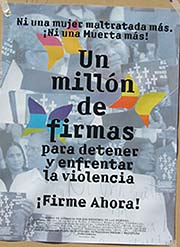 away from the beat and the lights, the health work goes on here, powered by committed LGBT personnel pushing their agenda of awareness and education about human sexuality.
away from the beat and the lights, the health work goes on here, powered by committed LGBT personnel pushing their agenda of awareness and education about human sexuality.
Occasionally the less evident advocacy work scores a point for human rights times and encrusted homophobia slowly change. Coming at it from a different angle is the gathering momentum of women’s rights advocates. In the central square one afternoon I stopped at a booth with volunteers handing out leaflets and brochures demanding more protections for women. (photo left)
The Dominican Republic is a mixed democratic culture of contradictions and opposing forces. The dancers jump late into the night and watch drag and strip shows. Across town the Cardinal fumes at such salacious behavior but is ignored by the young. Homophobia is alive and well as a public posture but privately there is a lot of tolerance and let-live attitudes and bi-swingers.
Young lesbians seize opportunities to come out and gather at O’Hara’s to organize a lesbian literary publication. I met no one—gay guy or lesbian lady—who walked in active fear of arrest or harassment, but few who would come out publicly. The ancient and modern place seemed to me a reasonably fine place to live an alternative life and find good love and friends. As I see it, gay life will continue to get better as the new generation gets noisier and more filled with justifiable pride to demand recognition and legal protections.
Comments from a GlobalGayz.com reader (June 2006):
I am a Dominican gay man living in the United States. Coming from a priviledge economic background, 15 years ago I felt that I couldn’t survive in my country and left. I really enjoyed your article on my country, first because normally Americans just don’t get it and you did. You got us in your pages; we are pictured with all our contradictions, with all our confusion, in your article.
But also, it is great to see how much we’ve moved forward.
In my times, the police would arrest transvesti sex workers beat them up, forced them to perform sex and then release them with no charge. And the community could do nothing but watch. The police would show up at the gay discos and beat up people just for fun. And the sad part was that they knew very well who to hit–the lower class that could not complain and if they did they would not be heard. I can go on for a while but there is no point on doing. I just want to say, thanks so much for the picture you draw of my country. It touched me.


